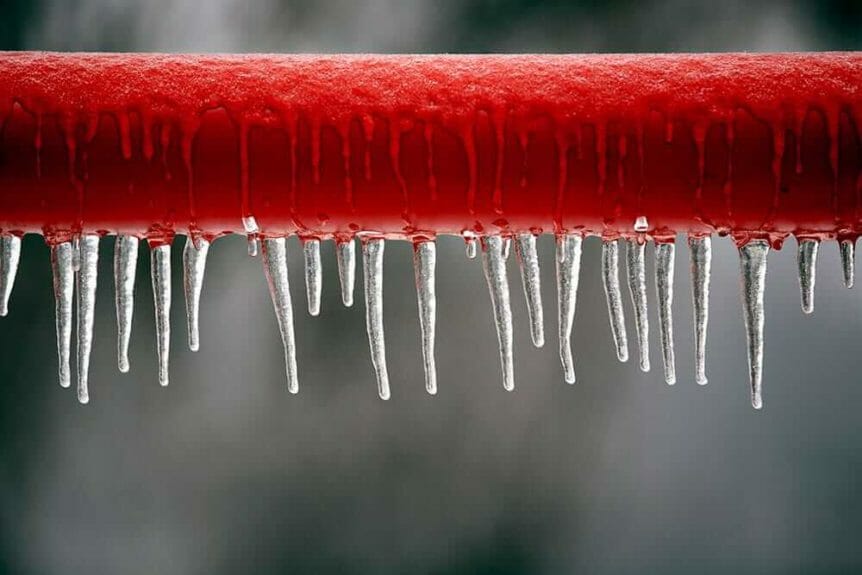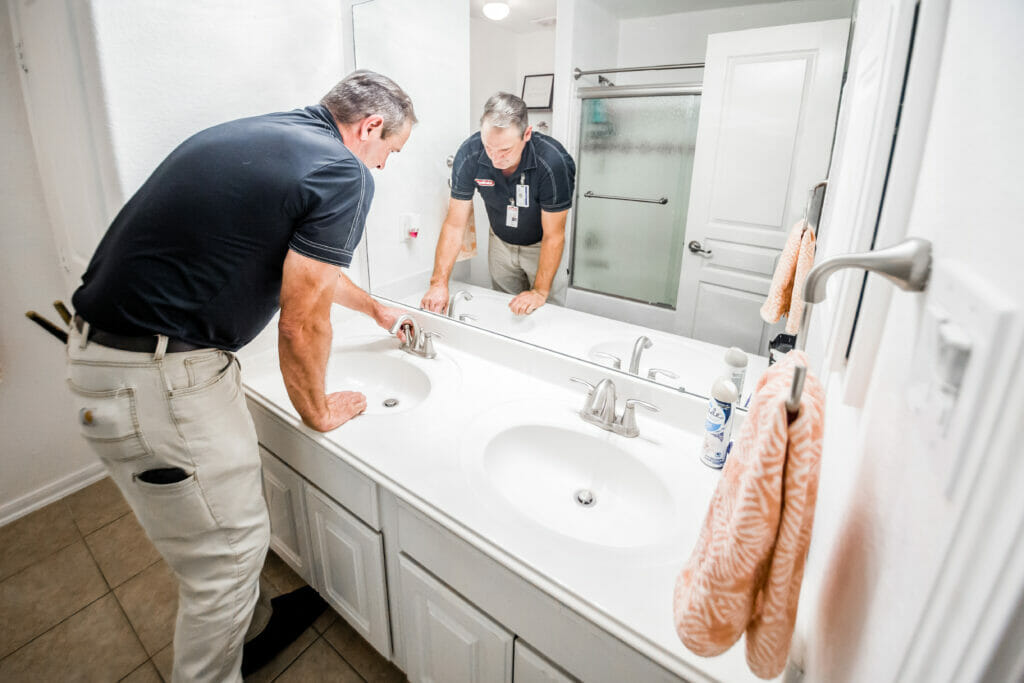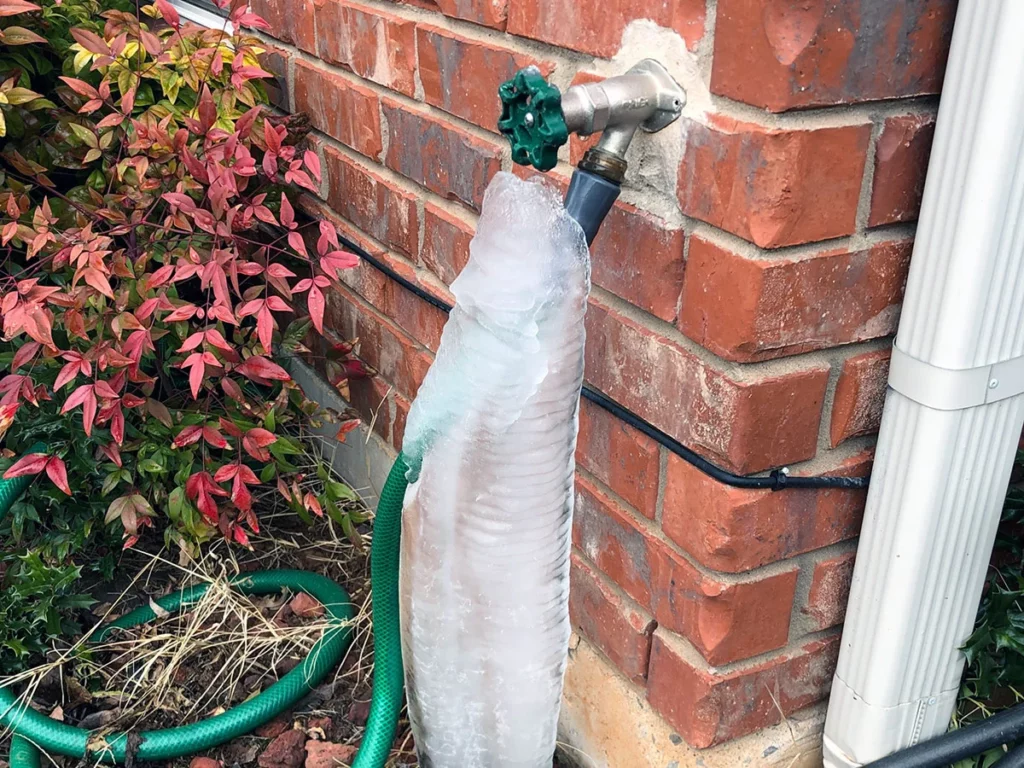
How to Keep Your Pipes From Freezing—and Prep Your Home For Winter
Do you know how to keep your pipes from freezing? Sure, Houston is known across the country for its hot and humid weather, but we do experience cold temperatures in the winter. Although our friends in the north and Midwest may laugh at what we think is “cold,” it still gets chilly enough that you must take the proper steps to protect your plumbing and prep your home for winter.
Having your heater inspected in the early fall is the most important thing every homeowner should do in preparation for lower temperatures. But when it comes to your plumbing, there are steps you should take before the first freeze to ensure all parts of your plumbing system make it through and prevent pipes from freezing. Not taking the proper precautions could result in frozen pipes that burst—which will cost you lots of money.
“Wind and cold air are what freeze pipes, and by properly covering up all exposed pipes from the wind, you are taking the right steps to make sure your pipes don’t freeze up and burst.” said John Moore Services Senior Operations Manager Joe Bany. “Protecting your plumbing by protecting pipes from the wind is key. The wind chill is colder than the outside temperature, and when it reaches a certain degree, it can destroy all unprotected piping.”
Protect Your Plumbing Before a Freeze
Wrap up all exposed pipes and hose bibs outside: All pipes, hose bibs, and sprinklers exposed to the outside elements are vulnerable to freeze if not properly wrapped AND insulated. Many people wrap a towel or newspaper around an exposed pipe, thinking it will be enough to prevent pipes from freezing, but this is not the case.
Don’t use a towel to protect an outdoor pipe: Because towels and newspapers hold moisture, it is like covering the pipes with a wet rag, increasing the freezing process. The best way to wrap pipes for winter is using polyethylene foam insulation, a foam wrap that completely covers exposed pipes and protects them from rain, wind, water, and cold air. Various sizes are available at your local hardware store.
Fix all outdoor leaks: Many times, homeowners have a leaky hose bib but do not notice it or get it fixed because it’s hidden away in the backyard. Now is the time to inspect and repair all leaks—even small ones. When we get cold weather, leaking water will freeze all the way up the hose bib and get back into the pipe. The tiniest leak can cause a great amount of damage.
Make sure you have enough attic insulation to protect your plumbing: Attic insulation isn’t just for keeping our home cool during the summer; it also keeps warm air inside during the winter—which is massively beneficial during a freeze. Pipes and other important systems in the home are located in the attic. If your home lacks the right amount of insulation, your pipes might freeze.
Protecting Your Houston Home During a Freeze
Keep a water faucet very slowly running: The best way to prevent your pipes from freezing is to turn on a water faucet and let the water slowly trickle. Doing so keeps the water moving inside the line, which makes it nearly impossible to freeze. It’s not as important to do this during the day when you are actively using water, but it should be done at night when everyone is sleeping.
Keep doors open: In many households, water heaters are located in a pantry or laundry room that doesn’t have an inside vent. These rooms can get extremely cold during the winter. By leaving the door to these types of rooms open, you actively push heated air inside, keeping your water heater warm. This will decrease your chances of your water line freezing up.
What to Do If Your Pipes Freeze
If something is missed and your pipes do freeze, don’t panic—just follow these five steps:
- Unhook your garden hoses from all outdoor faucets: This eliminates the possibility of having water in the hose bib connection and freezing there.
- Wrap your pipes to protect them from the cold: The wind chill is colder than the outside temperature, and when it reaches a certain degree it can destroy all unprotected piping. Protect your plumbing with materials made specifically for pipe covering and insulating pipe, such as a polyethylene foam insulation wrap.
- Drain your sprinkler system: After ensuring the pipes and the pressure vacuum breaker are wrapped and insulated, turn off the water valve to the sprinkler and drain the system to prevent water from expanding and damaging vulnerable parts of the system. Be sure to drain the pressure vacuum breaker after turning off the water to release the water hidden there and help avoid costly repairs.
- Check your thermostat and heater: Hopefully, your heater has already been inspected this season and had a recent tune-up and filter change. Flip your thermostat over to the heat setting, and do a quick test to make sure it turns on properly now to prevent unexpected surprises.
- Open your cabinet doors and leave faucets dripping: Keep your faucets on and allow the frozen water to slowly trickle out of the faucet. Additionally, it’s best to leave your cabinet doors open to help keep your pipes warmer.
The best way to unfreeze your pipes and protect your plumbing is to give them time. It may take a few hours, but eventually, they will thaw and return to normal. The biggest mistake homeowners make is to try to rush the process.
Do not use a torch (or similar heat source) to warm it up. This can create stress problems and cause the pipe to crack. Once your pipe has frozen, the right thing to do is to let it thaw naturally.
“The last thing you want to do to a frozen pipe is to use a torch to try and warm it up.” said Bany. “When you use a torch on a pipe that is already frozen, you can create stress problems and cause the pipe to crack. Once they freeze, the right thing to do is to wait it out. You never want to be aggressive with your plumbing because you will create bigger problems.”
Other Ways to Prep Your Home for Winter Weather
Houston homes are simply not built for cold weather, as we all remember from Winter Storm Uri. Additional precautions may be required to prepare your Houston area home for freezing temperatures.
Here are seven ways to prep your home for winter and keep your pipes from freezing.
- Get Your Roof Inspected: Your roof is your home’s first line of defense against the elements, and routine professional roofing inspections detect problems early, reducing repair costs and preventing damage inside your home. Additionally, addressing these issues early will increase the likelihood that a roofing repair is viable, so you may not have to replace your entire roofing system.
- Install Storm Windows: Glass storm windows create an insulating barrier between the cold winter weather outside and your windows. Additionally, these types of windows provide an extra layer of protection against snow and rain during severe storms.
- Clean and Inspect Your Gutters: If your gutters are clogged with leaves and other debris, water can back up and freeze, potentially causing damage to your roofing system. Cleaning your gutters before a big storm ensures melting snow runs off your roof and away from your home.
- Trim Your Tree Limbs: If you have trees on your property near your home, take the time to trim back tree limbs and remove dead branches before a storm. Snow can easily snap a dead or weakened branch, which could cause thousands of dollars in damages if the branch falls on your roof, siding, or porch.
- Protect Wood Decks and Porches: If you have a wooden deck or porch, protect it from snow or rain damage by clearing it of fallen leaves and other debris, then applying a fresh coat of sealer. Additionally, you can lay a large tarp down over your porch or deck to prevent snow from piling directly onto it.
- Bring in Outdoor Furniture, Plants, and Grills: Before the big storm, be sure to move any outdoor furniture, grills, and plants that can be moved inside to protect them from damage caused by high winds, snow, and rain.
- Seal Gaps Around Windows and Doors: A simple, effective way to prep your home for winter is to caulk any window gaps and add weather stripping to your doors. Not only will you protect your pipes by ensuring your home’s heat stays within your home, but you’ll improve your home’s energy efficiency.
Call a Plumber and Get Professional Help
Knowing how to keep pipes from freezing is half the battle. However, if your pipes do freeze, taking immediate action will protect your home from further damage.
After your pipes have thawed, it is a good idea to call a plumber to inspect your whole piping system and to make sure the freeze didn’t cause further leaks. If you call a plumber while your pipes are still frozen, there is not much that can be done because it’s nearly impossible to detect leakage or other damage.
Knowing what to do before, during, and after a freeze is an important part of home ownership. By taking the right steps and protecting your pipes from the elements, you are extending the life of your whole plumbing system.
If you are unsure if your home has the right amount of insulation—or have any questions regarding your plumbing system—call the experts at John Moore Services. We are only a phone call away and are happy to help.


